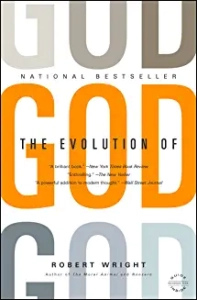The Evolution of God – a book review
by Connie Kent
Wright, Robert. The Evolution of God. Little, Brown, 2009.
 Wright’s thesis is that the concept of the Abrahamic God – the God of the God of Jews, the God of Christians and the God of Muslims – has evolved along with civilization. He says, “Gods speak through their followers, so when prevailing interpretations of a god change, the very character of the god changes.” In this well researched tome (over 560 pages, including an extensive bibliography), he looks at scriptures related to the Abrahamic god through the lens of history: when they were written and the circumstances surrounding their creation. God’s character is a product of the way Muslims, Christians and Jews think of Him. To put it succinctly, from the perspective of our times, cultural evolution is what has given us modern corporations, modern government, and modern religion.
Wright’s thesis is that the concept of the Abrahamic God – the God of the God of Jews, the God of Christians and the God of Muslims – has evolved along with civilization. He says, “Gods speak through their followers, so when prevailing interpretations of a god change, the very character of the god changes.” In this well researched tome (over 560 pages, including an extensive bibliography), he looks at scriptures related to the Abrahamic god through the lens of history: when they were written and the circumstances surrounding their creation. God’s character is a product of the way Muslims, Christians and Jews think of Him. To put it succinctly, from the perspective of our times, cultural evolution is what has given us modern corporations, modern government, and modern religion.
In studying Abrahamic scriptures, Wright finds that, contrary to the belief that Moses brought monotheism to the Middle East, ancient Israel (the home of Judaism and Christianity) was in fact polytheistic until after the Babylonian exile (5th century BCE). He finds evidence in parts of the Bible, for example, “that aren’t much read by modern believers,” of not only polytheism but of belief in the mediation of shamans among early leaders like Israel’s first king, Saul, who consulted a medium to raise the prophet Samuel from the grave for policy input (I Samuel 28:3-15).
Wright examines the multiple gods of hunter-gatherers and later of chiefdoms and ancient city-states, pointing to their beliefs as being displaced not all at once, but over time, off and on, a process more evolutionary than revolutionary. In texts of the three major Abrahamic religions, the belief in multiple gods evolved through the polytheism of ancient Israel, to monolatry and finally to monotheism, featuring at times a belligerent and intolerant god (based on a need to punish infidels); a tolerant god (based on the need for peaceful co-existence, as in the books of Ruth and Jonah); and, eventually, belief in a single omnipotent god.
But the single god wasn’t always a god of love. Wright claims that Jesus didn’t say, “Love your enemies” or extol the Good Samaritan. These misquotes were inserted in scripture decades after the Crucifixion. Muhammad was neither a militant religious zealot nor a benign spiritual leader but a cool political pragmatist.
Wright sees the “growth” of the Abrahamic god as an indicator of the growth of the moral order underlying history: as the scope of a social organization grows from hunter-gatherers to modern civilization, God tends to eventually catch up, despite Christian holy wars and Islamic jihad, drawing a larger expanse of humanity under his protection or at least a larger expanse of humanity under his toleration. But the movement toward moral truth has been globally modest, at best.
Wright argues that “Today globalization has made the planet too small to peacefully accommodate large religions that are at odds. If the Abrahamic god doesn’t foster tolerance, then we’re all in trouble.” Again, late in the book: “Maybe it’s not too much to say that the salvation of the planet – the coherence and robustness of an emerging global social organization – depends on [moral progress] . . . . once everybody is in the same boat, either they learn how to get along, or very bad things happen. . . . If the Abrahamic religions don’t respond to this ultimatum adaptively, if they don’t expand their moral imaginations, there is a chance of chaos on an unprecedented scale.”
Wright’s afterword is titled, “By the Way, What is God?” providing a provocative discussion of our difficulty conceptualizing what is beyond our comprehension. His appendix is titled, “How Human Nature Gave Birth to Religion,” another fascinating discussion. All in all, this book provides interesting food for thought. It’s a heavy book, in its size and in its concepts.
Wikipedia lists Wright as a journalist and author who writes about science, history, politics, and religion. He has written five books. As of 2019, he is a Visiting Professor of Science and Religion at Union Theological Seminary, New York.





Leave a Reply
Want to join the discussion?Feel free to contribute!